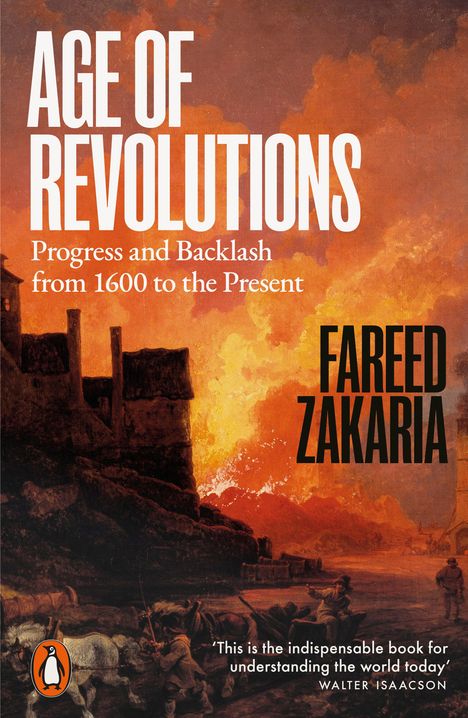Fareed Zakaria: Age of Revolutions, Kartoniert / Broschiert
Age of Revolutions
- Progress and Backlash from 1600 to the Present
- Verlag:
- Penguin Books Ltd (UK), 10/2025
- Einband:
- Kartoniert / Broschiert
- Sprache:
- Englisch
- ISBN-13:
- 9781802065596
- Artikelnummer:
- 11963902
- Umfang:
- 400 Seiten
- Gewicht:
- 500 g
- Maße:
- 198 x 129 mm
- Stärke:
- 35 mm
- Erscheinungstermin:
- 14.10.2025
- Hinweis
-
Achtung: Artikel ist nicht in deutscher Sprache!
Weitere Ausgaben von Age of Revolutions |
Preis |
|---|---|
| Buch, Kartoniert / Broschiert, Englisch | EUR 10,77* |
Klappentext
A New York Times Bestseller
The international best-selling author explores the revolutions, past and present, that define the chaotic, polarized and unstable age in which we live.
Fareed Zakaria first warned of the threat of "illiberal democracy" two decades ago. Now comes Age of Revolutions: Progress and Backlash from 1600 to the Present . A decade in the making, the book is based on deep research and conversations with world leaders from Emmanuel Macron to Lee Kuan Yew. In it Zakaria sets our era of populist chaos into the sweep of history.
Age of Revolutions tells the story of progress and backlash, of the rise of classical liberalism and of the many periods of rage and counter-revolution that followed seismic change. It begins with the upstart Dutch Republic, the first modern republic and techno-superpower where refugees and rebels flocked for individual liberty. That haven for liberalism was almost snuffed out by force - until Dutch ideas leapt across the English Channel in the so-called "Glorious Revolution." Not all revolutions were so glorious, however. The French Revolution shows us the dangers of radical change that is imposed top-down. Lasting change comes bottom-up, like the Industrial Revolution in Britain and the United States, which fueled the rise of the world's modern superpowers and gave birth to the political divides we know today. Even as Britain and America boomed, technology unsettled society and caused backlash from machine-smashing Luddites and others who felt threatened by this new world.
In the second half of the book, Zakaria details the revolutions that have convulsed our times: globalization in overdrive, digital transformation, the rise of identity politics, and the return of great power politics with a vengeful Russia and an ascendant China. Vladimir Putin and Xi Jingping see a world upended by liberalism - and want to turn back the clock on democracy, women's rights, and open societies. Even more dangerous than aggression abroad is democratic decay at home. This populist and cultural backlash that has infected the West threatens the very foundations of the world that the Enlightenment built - and that we all take too easily for granted.
The book warns us that liberalism's great strength has been freeing people from arbitrary constraints-but its great weakness has been leaving individuals isolated, to figure out for themselves what makes for a good life. This void - the hole in the heart - can all too easily be filled by tribalism, populism, and identity politics. Today's revolutions in technology and culture can even leave people so adrift that they turn against modernity itself.
Biografie
Fareed Zakaria, 1964 in Bombay geboren, lehrte an der Harvard University Internationale Beziehungen sowie Politische Philosophie und war Leitender Redakteur von Foreign Affairs . Seit dem Jahr 2000 ist er Chefredakteur von Newsweek International , das rund 3,5 Millionen Leser weltweit erreicht. Daneben moderiert Zakaria eine außenpolitische Sendung auf CNN und schreibt regelmäßig für Newsweek , die New York Times , das Wall Street Journal und den New Yorker .

